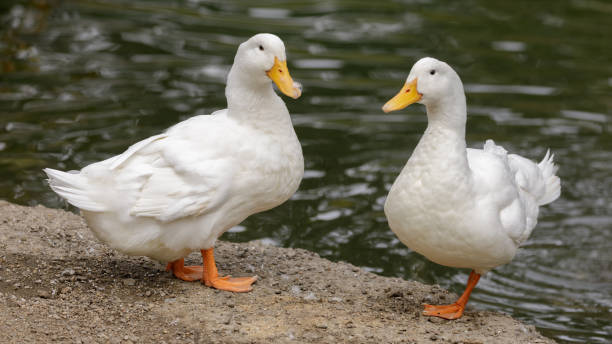When the phone rang early that morning, Matthew Lyson didn’t expect it to change his entire day. As the founder of Michigan Duck Rescue and Sanctuary (MDRS), he was used to hearing about waterfowl in need — but something about this call made him pause.
“There are two ducks just wandering around a golf course,” the caller explained. “They’ve been there for a while — no one seems to know where they came from.”
Matthew listened closely. The more he heard, the more urgent it sounded. Two ducks, alone, in the middle of a manicured course filled with people but not a single safe pond in sight — that wasn’t normal.
He grabbed his car keys, packed his rescue carrier, and hit the road.
“You get a sense for when something isn’t right,” Matthew said later. “And I could just tell these two were in trouble.”
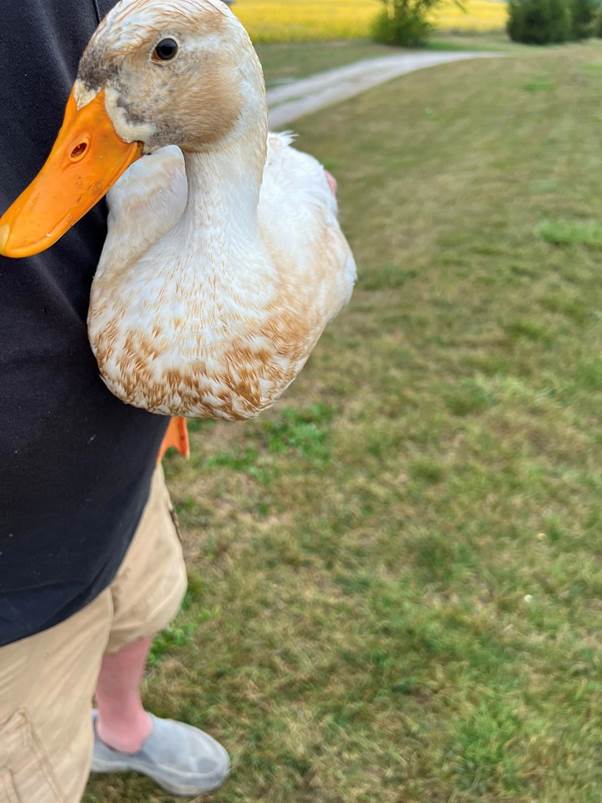
The drive took nearly an hour, winding through quiet Michigan backroads until the greens of the golf course came into view. Golf carts buzzed along the fairways, laughter and distant shouts filled the air — and then Matthew spotted them.
Two small ducks stood side by side near the edge of a sand bunker, the soft wind ruffling their feathers. They weren’t the sleek, wary mallards one usually sees around lakes and rivers. These ducks were heavier, softer in color, and far too tame. They didn’t try to fly away when people passed. Instead, they stared — curious, hopeful.
“They were just standing there like they belonged,” Matthew said. “But they didn’t. Domestic ducks can’t survive like that. They don’t know how to find food or protect themselves.”
As golfers drove by, the ducks waddled toward them, quacking gently as if saying hello. Some players tossed bits of crackers or sandwich bread, laughing at how friendly they were. But when the carts rolled away, the ducks stayed — side by side, lost again in a place that wasn’t meant for them.
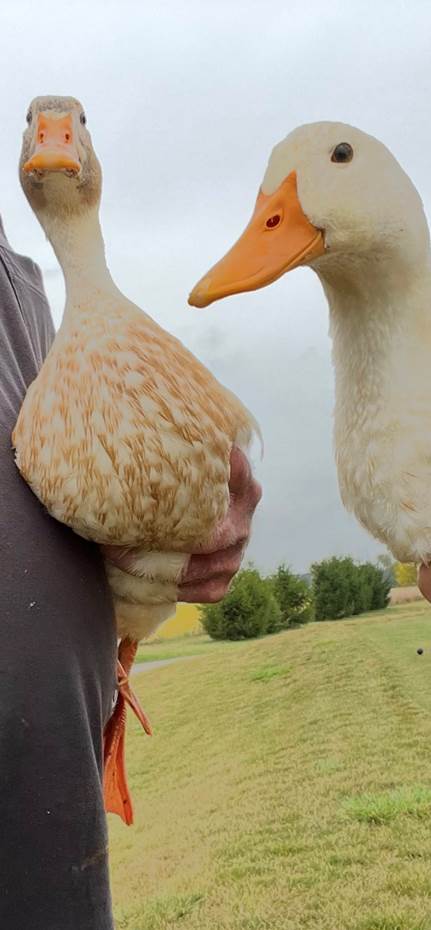
According to several golfers, the ducks had been there for days. No one knew who had left them, but it was clear they had once belonged to someone.
It broke Matthew’s heart to hear that. Domestic ducks, often bought as cute ducklings during spring holidays, grow quickly — and when they do, many people realize they can’t keep them. So they release them into parks, ponds, or, in this case, a golf course, assuming they’ll adapt to the wild.
But they don’t.
They can’t.
“They’ve been bred for hundreds of years to depend on people,” Matthew explained Most of them don’t survive more than a few weeks on their own.”
The fact that these two had lasted this long was a miracle — and likely thanks to their friendliness. They had learned that people meant food, and they kept trying to make friends, hoping someone would notice.
And someone finally did.
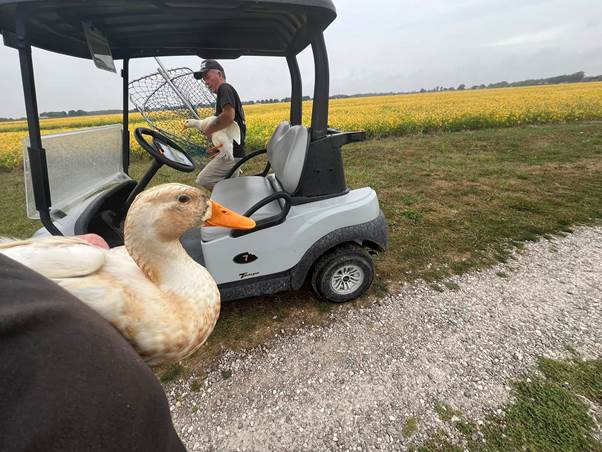
Matthew parked near the maintenance area and slowly walked toward the pair. The ducks froze for a moment, watching him with wide eyes. He knelt down, spoke softly, and pulled out a small bag of grain he always kept in his rescue kit.
“I never rush it,” he said. “You have to let them trust you first.”
The lighter-colored duck — a soft golden brown — tilted her head, clearly interested. Her companion, darker and slightly smaller, stayed close, eyes fixed on Matthew’s hands. They shuffled closer, quacking quietly.
It took about twenty minutes, but eventually, the two ducks came close enough for Matthew to gently scoop them up, one at a time. They didn’t struggle — just let out a few soft noises of surprise before settling into the carrier.
As Matthew carried them back to his car, several golfers stopped to watch.
“Are you taking them somewhere safe?” one woman asked.
“I am,” Matthew said. “They’ll be okay now.”
The drive back to the sanctuary was quiet. The two ducks rested side by side in their carrier, occasionally peeking out through the air holes. Every few minutes, Matthew would talk to them softly, reassuring them that they were safe.
“They were so calm,” he said. “It’s like they knew they were finally going home.”
He stopped halfway to offer them fresh water and small greens. They drank eagerly, then nestled close together again — inseparable even after everything they had gone through.
By the time the car turned into the gravel driveway of the Michigan Duck Rescue and Sanctuary, the pair had already become known to Matthew as “my precious angels.” The name fit perfectly.
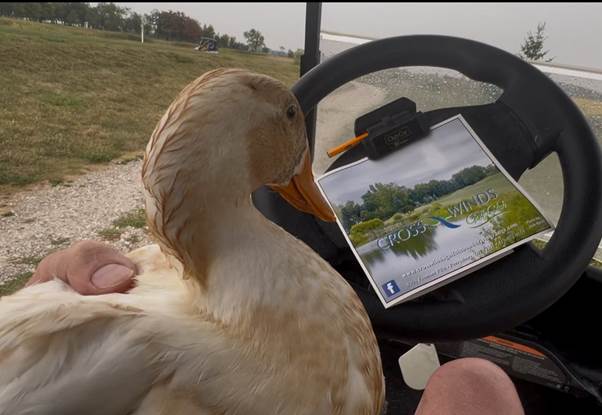
The sanctuary buzzed with gentle life — ponds surrounded by willows, ducks of every shape and color waddling freely, and the soft sound of splashing water. For animals who had known only fear, this was heaven.
Matthew opened the crate door and stepped back. The two ducks hesitated for a moment, blinking in the sunlight. Then, slowly, they stepped out — one after the other.
The brown one dipped her bill into the grass, nibbling curiously. The darker one trailed close behind, quacking softly as if asking if it was really safe.
Then, as soon as they saw the pond, both began waddling faster. They slipped into the water together and let out a synchronized quack of pure relief.
“It’s always the best moment,” Matthew said. “That first swim — it’s when they realize they’re free.”
In just a few days, the two ducks adapted to their new home as if they’d been there all along. The volunteers named them Luna and River — names inspired by peace and renewal.
Luna quickly became known for her friendly personality. She loved approaching volunteers at feeding time, flapping her wings and splashing playfully in the water. River, more reserved, often followed her lead, always keeping one eye on his best friend.
“They’re inseparable,” one volunteer laughed. “If Luna goes one way, River is right behind her. They do everything together — eat, swim, nap. It’s like they share one heart.”
Their transformation was remarkable. The stress lines that had shown in their feathers faded away, replaced by healthy gloss and energy. They’d gone from lonely, frightened strays to joyful, thriving ducks surrounded by others like them.

While Luna and River’s story ended with hope, Matthew knows that not every rescue does. For every pair of ducks he saves, there are others who aren’t found in time.
“It’s heartbreaking,” he said. “People buy them thinking they’re low-maintenance or just for fun. But ducks live for more than a decade. They need space, clean water, shelter, and daily care. They’re not decorations — they’re living beings.”
Abandoning domestic ducks is both cruel and dangerous. Without survival skills, they often starve, get injured, or fall prey to predators.
That’s why Matthew spends as much time educating the public as he does rescuing animals. The sanctuary’s website offers detailed guides on responsible duck care, adoption options, and what to do if you find a stray waterfowl.
“Our goal isn’t just to rescue,” he said. “It’s to stop the need for rescues altogether.”
Now, months after their rescue, Luna and River have become local favorites at the sanctuary. Visitors love watching them paddle side by side on the pond, dipping their heads underwater and occasionally shaking droplets into the air.
“They’ve made so many friends,” Matthew said. “Other rescued ducks joined them — it’s like they have a whole little family now.”
On sunny afternoons, the two can often be seen perched on a flat rock near the edge of the water, preening each other’s feathers. Their quiet bond speaks volumes — a symbol of trust, forgiveness, and resilience.
And though they may never understand why they were left behind, their story has already touched countless hearts.
Stories like Luna and River’s remind us how powerful compassion can be. One phone call, one decision to care, can change the course of a life — or in this case, two.
“People sometimes think small acts don’t matter,” Matthew said. “But for these ducks, it made all the difference.”
Their rescue also serves as a gentle reminder: animals aren’t disposable. Every creature — no matter how small or simple — deserves safety, kindness, and a place to belong.
As Matthew watches Luna and River glide peacefully across the sanctuary pond, the setting sun reflecting off their feathers, he smiles quietly.
“They’re not the first we’ve saved,” he said. “And they won’t be the last. But every single one reminds me why this work matters.”
